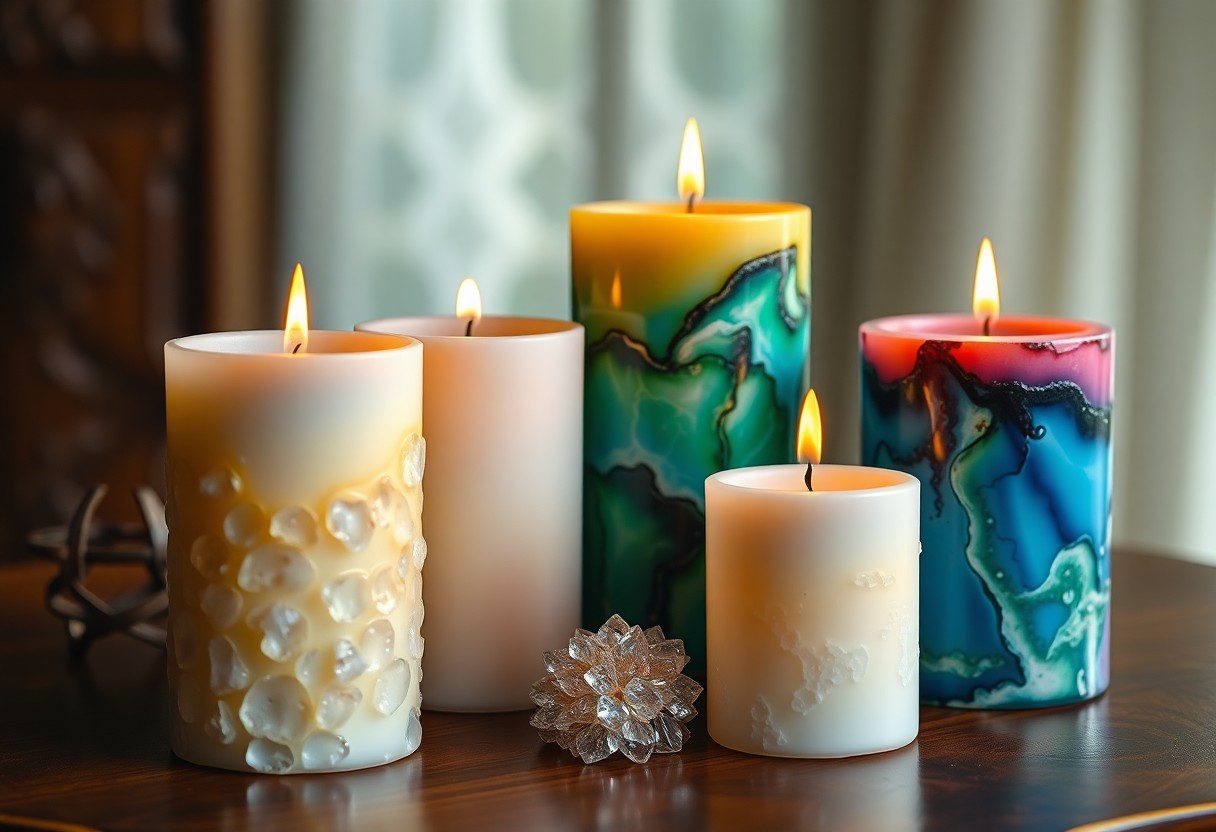The growing trend of palm wax candles and the sustainability debate.
Palm wax candles are gaining popularity as a natural and eco-friendly alternative to traditional paraffin wax candles. As you explore this trend, it’s important to consider the environmental impact of palm oil production, which can lead to deforestation and habitat loss. However, when sourced responsibly, palm wax can offer a sustainable option for eco-conscious consumers. This blog post will explore into the complexities of the sustainability debate surrounding palm wax candles, helping you make informed decisions for your home and planet.
Understanding Palm Wax
Before delving into the benefits and concerns surrounding palm wax candles, it’s important to grasp what palm wax actually is. This natural wax is derived from the flesh of palm fruit, specifically from oil palm trees. Renowned for its unique appeal, palm wax boasts a crystalline structure that allows for an aesthetically pleasing, frosted appearance in finished candles. You may also appreciate its biodegradability and renewability, making it a popular choice among eco-conscious consumers.
Origin and Production
Behind the popularity of palm wax lies a complex story. Sourced primarily from countries like Indonesia and Malaysia, the production of palm wax involves extracting oils from palm fruit, which is then processed into wax. It’s vital to note that the agricultural practices surrounding palm oil and palm wax production can vary significantly, with some practices leading to environmental degradation while others aim for sustainable harvesting. As a consumer, you should seek out certifications that guarantee sustainable sourcing.
Properties and Benefits
At its core, palm wax offers several appealing features. It has excellent scent throw, allowing you to enjoy fragrances effectively when burned. Additionally, palm wax burns cleaner than many petroleum-based waxes, reducing the release of harmful toxins into your home. Its ability to hold vibrant colors and design patterns makes it a favorite for many candle manufacturers. You’ll find that its natural properties enhance the overall candle experience.
Understanding the properties of palm wax helps you appreciate why it’s gaining traction in the candle market. Its long burn time not only saves you money but also limits waste, contributing to its perceived sustainability. The use of natural, renewable resources means palm wax is a better alternative to paraffin wax, which is derived from oil and contributes to environmental degradation. However, be sure to prioritize suppliers who practice responsible farming and support environmental stewardship; this can significantly enhance the positive impact of your candle purchases.
The Sustainability Landscape
One emerging aspect of sustainability is the growing preference for palm wax candles. These candles are made from palm oil derived from sustainably managed plantations, making them a better choice for eco-conscious consumers. For more information, you can explore Palm Wax: A Sustainable Choice for Eco-Friendly Candles.
Environmental Impact of Palm Oil Production
Landscape issues surrounding palm oil production include deforestation, loss of biodiversity, and greenhouse gas emissions. These environmental concerns are heightened by unsustainable farming practices that can devastate ecosystems. As a consumer, being informed about these impacts can help you choose products from brands that prioritize sustainable sourcing.
Certifications and Sustainable Practices
To ensure you’re making responsible purchasing decisions, it’s important to look for certifications that validate sustainable practices. Products certified by organizations such as the Roundtable on Sustainable Palm Oil (RSPO) indicate adherence to strict environmental and social standards.
Also, certifications like these promote better farming methods and support local communities. By choosing certified palm wax candles, you can actively contribute to a more sustainable palm oil industry. Opting for products with these endorsements helps combat deforestation and fosters positive changes in agricultural practices. Being a discerning consumer empowers you to make a difference in the environmental impact of your choices.
The Rise of Palm Wax Candles
Now, you may be noticing an increasing popularity of palm wax candles in the marketplace. These candles, made from the palm oil of palm trees, are marketed as a more sustainable alternative to traditional paraffin wax candles. Producers tout their natural properties, unique textures, and ability to maintain vibrant colors, making them visually appealing while offering a cleaner burn. As awareness about environmentally friendly products grows, consumers are turning to palm wax candles, seeking a balance between luxury and sustainability.
Market Trends and Consumer Preferences
For today’s consumers, the demand for sustainable products is paving the way for a significant shift in purchasing preferences. People are increasingly seeking out items that are eco-friendly, leading to a rise in the popularity of palm wax candles. As you search for candles, you may notice labels that emphasize natural ingredients, ethical sourcing, and zero-waste packaging. This growing trend reflects a broader commitment to sustainability that many consumers, like yourself, are eager to embrace.
Comparison with Other Candle Materials
Palm wax has its own distinct advantages and disadvantages when compared to other candle materials. The table below outlines how palm wax measures against popular alternatives like paraffin and soy wax.
| Material | Pros and Cons |
| Palma Wax | Eco-friendly, longer burning time, unique aesthetics; however, concerns about palm oil sustainability. |
| Paraffin Wax | Inexpensive, widely available; but, comes from petroleum and emits harmful toxins when burned. |
| Soy Wax | Biodegradable and renewable; yet, soy production can be associated with deforestation. |
Market trends indicate that palm wax candles are on the rise, primarily due to the growing eco-consciousness of consumers like you. While palm wax offers a host of appealing benefits, such as its natural properties and longer burn time, it also has its share of complications related to sustainable palm oil sourcing. This contrast makes it necessary for you to consider both the environmental impact and ethical implications of your choices when selecting candles. Ultimately, your decision can play a role in promoting sustainable practices within the industry.
Ethical Considerations
After delving into the sustainability of palm wax candles, it’s vital to examine the ethical implications surrounding their production. You may wonder, are candles eco-friendly? Ethical sourcing of palm oil can contribute positively to local economies, but the industry’s historical issues, including deforestation and labor rights violations, raise significant concerns. Ensuring that the palm wax you choose is sustainably sourced is vital for promoting ethical practices in this burgeoning market.
Social Implications of Palm Oil Cultivation
Social factors play a significant role in the palm oil industry, particularly regarding the rights of indigenous communities. You should be aware that this cultivation often leads to land disputes, forcing local populations off their ancestral lands. Support for sustainable palm wax can help improve these conditions by encouraging fair labor practices and accountability.
Biodegradability and Life Cycle Analysis
To understand the environmental impact of palm wax candles, you need to consider their biodegradability and life cycle. These candles are compostable and break down more easily than traditional paraffin candles, which can take years to decompose. Choosing products that align with your values means assessing not just their immediate use but also their overall environmental footprint.
At the heart of the discussion on biodegradability and life cycle analysis is the fact that palm wax candles are typically made from renewable resources and can be more environmentally friendly than alternatives. The process of cultivating sustainable palm oil involves less carbon emissions and uses less energy compared to non-renewable options. However, if sourced irresponsibly, palm oil production can lead to significant deforestation and habitat destruction. This duality highlights the importance of making informed choices, so you can support candles that provide a positive environmental impact without compromising ethical standards.
Alternatives to Palm Wax
For those seeking sustainable options, various alternatives to palm wax exist that can fulfill your candle-making needs without contributing to deforestation or habitat loss. These options allow you to enjoy the ambiance of candles without compromising your values. Exploring soy wax, beeswax, or other eco-friendly materials can provide you with high-quality, sustainable products that align with your desire for environmentally conscious living.
Soy, Beeswax, and Other Eco-Friendly Options
Alternatives like soy wax and beeswax offer unique benefits for environmentally conscious candle enthusiasts. Soy wax, derived from soybeans, is renewable and biodegradable, while beeswax is a natural substance that purifies the air as it burns. Other options, such as coconut wax and plant-based blends, also present eco-conscious choices, making it easier for you to support sustainable practices in your candle selections.
Innovations in Sustainable Candle Making
Innovations in sustainable candle making are transforming the industry by introducing new materials and processes that minimize environmental impact. These advancements include biodegradable additives, recycled packaging, and the use of renewable energy during production. In fact, candle makers are now experimenting with innovative wax blends that incorporate upcycled materials, leading to lower emissions and a smaller carbon footprint. Such developments empower you to choose candles that not only illuminate your space but also reflect your commitment to sustainability and conservation.
The Future of Palm Wax Candles
Once again, the candle industry is witnessing a significant shift towards palm wax products as consumers increasingly seek sustainable alternatives. With the growing demand for environmentally friendly options, palm wax candles present a viable solution. They not only offer a natural, biodegradable choice but also come with unique benefits such as excellent scent throw and a longer burn time. As new innovations and practices emerge, you may find yourself drawn to the allure of palm wax candles in your quest for eco-conscious living.
Industry Regulations and Standards
An emerging area of focus in the palm wax candle industry is the establishment of robust regulations and standards. As consumer interest grows, policymakers and industry leaders are tasked with ensuring ethical sourcing and sustainable production. These regulations will guide manufacturers in adopting best practices, ultimately fostering transparency and accountability. As a consumer, staying informed about these standards will help you make educated choices and support brands committed to sustainability.
Consumer Awareness and Education
Below the surface of consumer trends lies an important need for greater understanding of palm wax candles. As you explore your options, increasing your awareness about sourcing, production, and environmental impacts is important. An informed decision will empower you to support brands that prioritize ethical practices while enjoying a quality product.
In fact, education about palm wax candles empowers you to discern between products that genuinely uphold sustainable values and those that may only claim to do so. By considering factors such as source cultivation, certifications, and the manufacturing process, you can aid in reducing harmful practices. Engaging with reputable brands and educating yourself about the benefits and drawbacks of palm wax will foster transparency. Ultimately, this knowledge enables you to align your choices with your values, enhancing your eco-conscious lifestyle.
To wrap up
From above, you’ve seen how the trend of palm wax candles intersects with the sustainability debate. As you explore your options, consider the environmental implications of palm oil production and its impact on biodiversity. By choosing responsibly sourced palm wax, you can enjoy the benefits of these unique candles while supporting sustainable practices. Engaging with brands that prioritize eco-friendly sourcing allows you to align your values with your purchasing decisions, ultimately contributing to a more sustainable future.
FAQ
Q: What are palm wax candles and how are they made?
A: Palm wax candles are made from the natural wax derived from palm oil, specifically from the fruit of the oil palm tree. The process involves extracting the oil, subjecting it to a hydrogenation process to create wax, and then cooling it to form solidified pieces. This wax has unique crystalline structures that give palm wax candles their characteristic look and texture, as well as exceptional burning properties.
Q: What are the benefits of using palm wax candles over paraffin candles?
A: Palm wax candles offer several advantages compared to traditional paraffin candles. First, they are derived from a renewable resource as opposed to being a petroleum-based product. Additionally, palm wax candles burn cleaner, producing less soot, and often have a longer burn time. Furthermore, due to their natural composition, they can enhance the scent throw when used with vital oils or fragrance oils, providing a more pleasant aroma when burned.
Q: Is palm wax sustainable, and what are the concerns surrounding its production?
A: The sustainability of palm wax largely depends on sourcing practices. While palm oil can be produced sustainably, there are significant concerns regarding deforestation, habitat destruction, and social issues associated with large-scale palm oil plantations. To address these concerns, it is important for consumers to look for certifications such as the Roundtable on Sustainable Palm Oil (RSPO) which ensures that the palm oil used is produced responsibly and ethically.
Q: How does the production of palm wax candles compare to other natural waxes like soy or beeswax?
A: Unlike soy wax, which is also derived from a plant source (soybeans) and is often considered more sustainable, palm wax production is more controversial due to environmental impacts linked to palm oil cultivation. Beeswax, another popular natural wax, is often harvested sustainably but is limited by the availability of bees and comes at a higher price point. Each type of wax has its pros and cons, and the choice often depends on personal preferences and values regarding sustainability and support for certain agricultural practices.
Q: Are there any certifications or labels to look for when choosing palm wax candles to ensure sustainability?
A: Yes, consumers can look for various certifications when purchasing palm wax candles to confirm ethical sourcing. The most notable is the Roundtable on Sustainable Palm Oil (RSPO) certification, which guarantees that the palm oil used in the production adheres to strict environmental and social standards. Other labels that indicate sustainable practices may include Fair Trade or other eco-labels that emphasize responsible sourcing and production practices, reflecting a commitment to environmental sustainability and the welfare of farmers.










